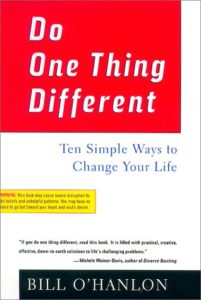
Do One Thing Different
By Bill O’Hanlon
224 pages
Originally published in 1999 by William Morrow and Company
A cop comes upon a drunk on his hands and knees at night under a streetlight.
“What are you doing?” he asks.
“I’m looking for my keys,” the drunkard replies, slurring.
The cop decides to help him. After a few minutes, he looks up and asks: “Do you remember the last place you saw them?”
“Sure,” the sot replies, straightening up and pointing into the darkness across the street. “I dropped them over there.”
The cop laughs. “Then why the hell are we looking here?”
The drunkard gives him a condescending look. “Because the light is better.”
Explanations, Bill O’Hanlon says in Do One Thing Different, do not solve problems. They “often give us an illusion of help by enabling us to understand why we have a problem but not giving us any concrete ways to actually solve it.”
And that, he says, is why psychoanalysis and other forms of explanation-based therapies don’t work. Instead of solutions:
* They orient you toward what can’t be changed – the past or personality characteristics.
* They encourage you to view yourself as a victim – of your childhood, your biology, your family, or societal oppression.
* They sometimes create new problems you didn’t know you had.
Reading this book again more than 20 years after it was published, it struck me that O’Hanlon was on to something that was even back then a problem with American culture. As he put it:
“These systems of explanation lead to victim culture, in which people focus on the damage done to them in childhood or their current relationships. This results in a tendency to blame others and look outside ourselves for solutions – to turn to experts or self-help books and groups.”
One of the things I best remember from the Introduction to Psychology class I took in 1969 was that it took about 7 or 8 years for traumatized people treated with psychoanalysis to recover. That was the same rate at which traumatized people recovered with no treatment at all.
O’Hanlon recommends a different approach to treating psychological challenges and overcoming emotional debris: his take on cognitive behavioral therapy.
As you may know from previous essays, I’m a big fan of Viktor Frankl and cognitive behavioral therapy, existential therapy, and logotherapy. All of which is to say that, although Do One Thing Different may be a little simplistic, I enjoyed reading it a second time. (And I especially enjoyed reading my marginalia.)
Critical Reviews
* “One reason why I loved this book is that rather than giving specific solutions to specific problems, it hands us tools which we can use in any problem scenario.” (Avani Mehta)
* “Chock-full of interesting stories and examples that describe the subtleties and practicalities of the solution-oriented approach.” (Family Therapy Networker)
* “If you do one thing different, read this book! It is filled with practical, creative, effective, down-to-earth solutions to life’s challenging problems.” (Michele Weiner-Davis, author of Divorce Busting)
